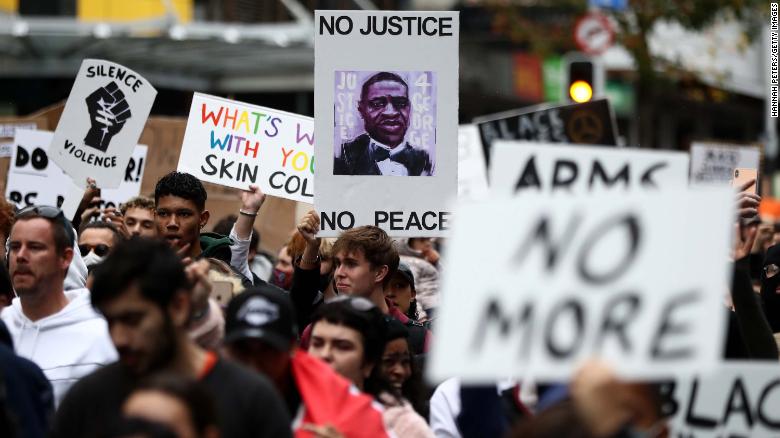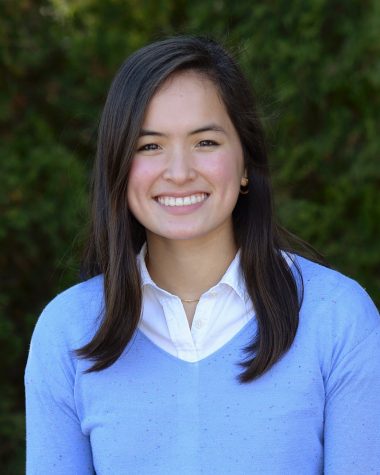This is a historic moment, and we all have a part to play.
June 7, 2020
Since the coronavirus began its destructive streak across the globe, we students have come to the intimidating realization that we are living through an unprecedented time, a chapter that will be recorded in history textbooks for years to come. But in the past week, this pandemic has largely been pushed to the backs of our minds in response to the killing of George Floyd.
On May 25, four Minneapolis police officers handcuffed Floyd and pinned him to the ground. One officer pressed his knee into Floyd’s neck for 8 minutes and 46 seconds, ignoring his cries of “I can’t breathe!” even as he fell unconscious. Floyd was later declared dead at a hospital in Minneapolis.
Videos of this savage confrontation — coupled with the news of Ahmaud Arbery’s and Breonna Taylor’s unjust killings — instantly caused public outrage to spread across news outlets and social media, and peaceful protestors have mobilized across the country to demand justice. But some gatherings devolved into civil unrest, as violent riots and looting emerged in almost every major American city. Rioters have set city buildings on fire and destroyed local businesses, with some brutally beating business owners attempting to protect their establishments. These uprisings have largely overwhelmed city police forces, prompting local officials to declare city-wide curfews and request military assistance.
However, it is crucial to distinguish between those maintaining peaceful protests and those committing acts of violence. Anarchists, white supremacists, and members of radical groups like Antifa have been widely accused of coordinating efforts to incite violence in peaceful gatherings. Meanwhile, people across the country — including members of our own SLS community — have engaged in peaceful, non-violent protests to demand justice and stand in solidarity with the black community.
As teenagers largely separated from the violence in these cities, much of our interaction with these issues occurs not in the streets, but on social media, which has undoubtedly become a reflection of our generation’s hearts and minds. Over the last week, each of my social media accounts has been flooded with posts rightfully denouncing Chauvin’s actions and paying homage to George Floyd’s memory.
Seeing and reading reports of riots and racial violence has transformed the past two weeks into a blur of confusion and emotion. While violent images and reminders of America’s history of racial injustice are at times disheartening and overwhelming, these past 13 days have carried unexpected — and challenging — silver linings, as they have forced me to reflect on my own beliefs and assumptions.
Over the past two weeks, I have come to a startling realization about my own consumption of news, which has been tainted by my use of social media. Whenever a controversy surfaces, I am quick to scroll past the political posts that fill my Instagram feed. As a conservative member of a primarily liberal student body, I tend to see these repetitious posts as an annoyance, and a reminder of stances with which I disagree.
I’m ashamed to admit that I have grown accustomed to this method of swiping uncomfortable issues away; I have sometimes turned a blind eye to reports of injustice. Each time an instance of police brutality arises, I hasten to jump from heartache and anger to questioning the facts of the incident, often believing some cases to be overblown in favor of supporting a liberal agenda. While I believe the search for facts and clarity to be necessary, the harm in this practice is that I’ve desensitized myself to the tragic reality of police brutality; I’ve internalized my political beliefs to such an extent that I often ignore the suffering of fellow Americans.
So in many ways, the murder of George Floyd was a wake-up call. This killing was so obviously unjust and cruel, and Floyd’s cries so tragic and heartbreaking, that I could not ignore this issue anymore; it is my duty not to ignore injustice, but to actively confront it.
For me, this process starts with holding myself accountable for my own education. In a way, I’m grateful that I am having this realization now: the pandemic has given me the gift of free time. But beyond this summer, we are quickly approaching the 2020 election, in which I will cast a vote for the first time. It is my responsibility to gain a deeper understanding of our political, judicial, and law-enforcement systems, both by engaging with responsible journalism and my peers’ points of view, so that when the time comes to visit the ballot box, I can make a truly informed decision and take an active role in shaping our country’s future.
Whatever your political belief, I urge you to join me in this path towards understanding and empathy. For many young adults, this task must begin by diffusing the polarization that pervades social media, which has been exacerbated by some peaceful protests’ transformation into violent riots.
As this unrest has continued, I have noticed a common thread throughout social media posts — the idea that riots and violence are necessary steps in the road to change, and that it is inappropriate to criticize a marginalized group’s method of protesting.
One such post, which has been “liked” over 80,000 times on Twitter and Instagram combined, claimed that “Many of those looting and vandalizing are not protestors . . . [E]ven if you don’t mean to, when you focus on [looting and vandalism], you are sending the message that you care more about property damage than actual human lives.”
The user is, of course, correct in separating rioters from nonviolent protesters. But the idea that condemning looting and rioting is equivalent to disregarding life is simply false. Destroying fellow Americans’ storefronts and beating their owners in the street is abhorrent, and decrying these acts is a matter of human decency, not political malice. Moreover, its widespread acceptance represents a frightening commonplace among young activists of every political leaning: the tendency to paint those with opposing views as thoughtless and cruel.
If we are to truly honor these slain Americans’ memories and advocate for permanent change, we must abandon this harmful rhetoric and realize that one can simultaneously support the anti-racism movement while denouncing street violence. So as we navigate through this turbulence, remember to stop and listen to your peers and seek to learn from their perspectives rather than drawing quick judgments. Continue to raise awareness and peacefully protest. Do not let this moment — or George Floyd’s memory — go to waste. Instead, use it to grow as a learner, a thinker, and a citizen of your local and national communities.
To my fellow rising seniors, consider the weight of the ballots we will hold in our hands in just five short months. Educate yourselves on local and presidential candidates’ philosophies, and vote for those who advocate for improved police training and reform in the judicial system. Let’s make this a truly historic moment, not because of the devastation that plagues our society, but because of the unity and dedication we showed in the face of injustice.




